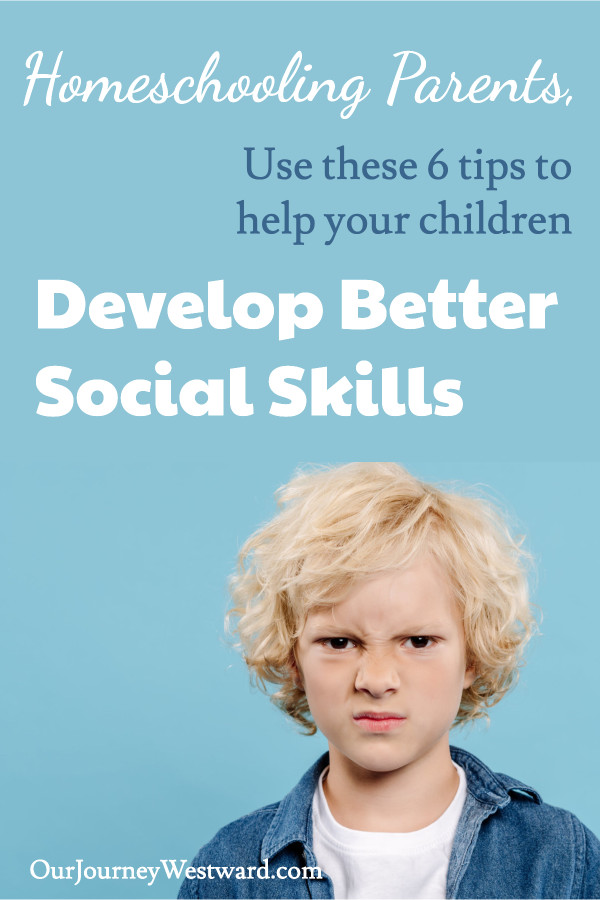6 Tips To Develop Better Social Skills in the Homeschool
We’ve talked a lot about brain training for cognitive skills here at Our Journey Westward. Closely related to cognitive skills are social skills. This article focuses on some easy ways to improve social skills in the homeschool.
Don’t get “social skills” confused with “socialization”. One of the biggest thorns in the side of any homeschooler is the idea that homeschooling leads to a lack of socialization. That’s complete nonsense and not at all what this article addresses.
Social skills, instead, are the things we do to communicate with one another. They include verbal and non-verbal things like speech, gestures, body language, and even personal appearance.
Just like some kids need some specific direction and exercises to strengthen cognitive skills through brain training, you might find that social skills sometimes need a little work. Please welcome guest author, Leanne Sherred, M.S. CCC-SLP, as she shares some insight and tips about improving social skills in the homeschool.

What are Social Skills?
Social skills are taught as early as infancy and are a key part of early childhood development. They include the subtle rules that take place when two people engage and communicate with each other, and the ability to function productively in the world around them. Social skills go just beyond our verbal communication; it includes our gestures, body language, and even the facial expressions we make.
Strong social skills are important for everyone – particularly children. They help us build and maintain positive relationships and friendships. And when things don’t go our way, they help us resolve conflict cooperatively. Finally, they are also important in understanding and being empathetic. We want to raise children that can imagine themselves in other people’s shoes, sympathize with their situations, recognize their hardships, and ultimately care for their feelings.
It is very common for children to struggle with social skills as they grow up. This in no way means your child is uncaring, or mean hearted, or contemptuous. It simply means that as their parent and educator, it’s vitally important to recognize these signs and implement strategies to help them overcome any challenges.
Make sure to be extra proactive and vigilant if you notice any of the following signs:
- Excessively interrupting people
- Lack of awareness of social cues
- Inability to pick up on body language or facial expressions
- Difficulty with turn-taking
- Trouble actively listening to people, or quickly losing attention
- Sharing inappropriate information
- Failure to understand jokes or sarcasm
- Difficulty resolving conflict without tension or anger
Helping Your Child with Social Skills in the Homeschool
As a speech-language pathologist, I routinely work with children who struggle with social skills. Here are a few tips and strategies you can incorporate into your curriculum or, more casually, use during playtime and daily interactions.
1. Role Playing
You may first notice your child’s social skills need a little work during common social interactions during visits to the playground or when someone doesn’t want to share toys with friends. Role-playing is a great strategy that involves acting out common situations that your child may find themselves in, such as a birthday party, a playdate, or even interacting with their relatives.
To do this, you can ask your child to share their toys (“when you’re done, can I play with that?”), pretend to introduce yourself for the first time (“Hi, my name is…”), or ask your child to play (“can I play too?”). When you ask these questions, make sure to have fun and get in character! You can use different voices, make facial expressions, and use gestures. You also want to demonstrate to your child what should happen in certain situations and lead by example, so be sure to switch roles from time to time and let them ask the questions.
2. Turn-Taking Games
Whether you’re rolling a dice, playing a two-person video game, or dealing a hand of cards, many games have a turn-taking component naturally built into them. Use this to your advantage for teaching social skills in the homeschool. This a fun and engaging way to teach your child the benefits and value of patiently waiting their turn. Additionally, even star athletes routinely lose games. It’s important to teach your child to lose graciously, maintain their composure, and keep on playing!
3. Know Your Child’s Limits
Every person is different, and we all have different comfort levels in social settings. For some, the more people the merrier – they thrive in large settings with multiple people. Others, however, are more introverted and prefer smaller groups. What’s important is to know your child’s limits and their preferred social styles.
One important note, don’t force anything upon them that’s unnatural or uncomfortable. Hugs are a great example of this. While many children love hugs and affection, for others it can feel invasive and overwhelming. It’s important that children have autonomy over their bodies so they can continue to feel secure. Therefore, try not to insist that your child gives hugs – even to their weird aunt – and instead let them decide in what situations they feel comfortable doing so.
4. Follow Their Interests
Every child has their own unique interests. Maybe they love to be outdoors, or swing on the playground, or play sports or an instrument. Perfect! Make sure to follow your child’s interests. When working to develop better social skills, it’s important to encourage them to participate in these preferred activities with other like minded children who enjoy the same things.
Try to facilitate this by setting up playdates – or find classes, clubs, teams, or groups to enjoy these activities with. When children have similar interests, it can help improve their social cohesion and encourage natural interactions that will continue to grow and develop their social skills.
5. Emphasize Empathy
As mentioned before, empathy is one of the most important components of rearing a child that is emotionally aware, compassionate, and can recognize people’s feelings and respond in a caring way. There are many ways parents can help children foster a strong sense of empathy and emotional maturity.
Make sure to talk openly and honestly about how your child might feel in certain situations. For example, this can be easily done when watching a movie or reading a book. Conversationally, ask your child how they would feel in a certain scenario (“how would you feel if your dog ran away?”) or how they’d emphasize with someone (“how would you help your best friend if their dog ran away?”). This will force your child to think about their own feelings as well as relate to someone else’s emotional state.
6. Seek Professional Help
If you believe your child needs extra help developing strong social skills, you may want to seek professional help. Speech-language pathologists are communication experts who can help evaluate and treat children that struggle socially. They’ll develop an individualized treatment plan based on your child’s needs, and work with you and your child to improve their communication abilities.
Speech therapists can also provide additional at-home tips and recommendations to incorporate social skill-building exercises into their homeschooling curriculum and daily routines. They can even help determine whether a child’s speech and language difficulties may be associated with other developmental conditions, such as Autism Spectrum Disorder.
Many homeschooling parents who prefer at-home instruction, or who want to avoid the high costs and inconvenient commute times of private speech therapy clinics, prefer to receive therapy online. With online speech therapy, all speech therapy is delivered virtually from the comfort of your home. It’s just like any other type of video chatting (Zoom or FaceTime), but on the other side is a qualified and licensed speech therapist. While this may be a new therapy delivery model for some parents, research has shown that online speech therapy is just as effective as traditional, in-person therapy.

Leanne Sherred, M.S. CCC-SLP calls Austin, Texas home but studied Speech and Hearing Sciences at the George Washington University in Washington, D.C. and gained her Master’s in Speech-language pathology from Northwestern University in Evanston, Illinois. She has worked in pediatric outpatient clinics, schools, early intervention, and home health. Leanne is currently the President and Founder of Expressable online speech therapy, a company that envisions a modern and affordable way for anyone who needs speech therapy to access these vital services.
Other Posts You Might Enjoy

I taught at a behavior program for behaviorally disordered teen boys for eighteen years and had family members with personality disorders. It’s easy to get beaten down, but by noticing and highlighting when a child shows empathy makes a huge difference! Barbara Rice author of “Tune-Up Your Relationship”
Thanks for sharing this! This is actually my worry because my kids are being schooled at home, so they don’t go to regular school. Because whether they homeschool or not, ofcourse i want my children to make friends and interact kindly.